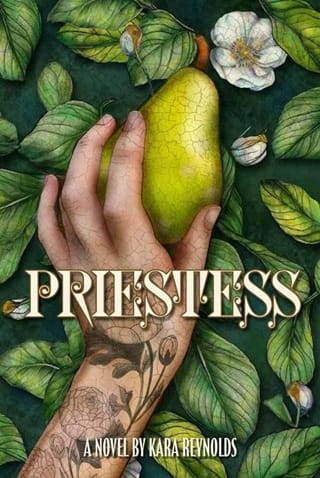39. Living
In this manner, days passed.
In the mornings, I woke in Alric’s room and walked down across the landing on the stairwell to the second level dormitories.
I bathed with Helena, Maureen, Mischa, Catrin, River and Quinn and we made our way to the dining hall.
I got used to walking everywhere with the weight of the sagaris on my right hip.
Then I went to the temple and met with Cian for further instruction, dining with him and the other earth temple staff for luncheon and then spending the afternoon in the temple antechamber observing the priests and their acolytes in their civil agrarian service.
I would rejoin my friends for the final meal of the day and retire to Alric’s room to read the three books Cian had given me.
I quickly finished the handwritten account of Tintar’s geography, covering the harsh coastal rock of the middle of the country, the northern Hintercliff ranges and the southern marshlands that were nigh inhabitable but lush with grasses, blueberries, elderberries and swamp dewberries and cattails that could be dried and ground down into flour.
The inside of the country, mostly corralled in by Nyossa, was agricultural.
‘The Remarkable Loaming of Our Goddess’ was more stimulating and went into descriptive detail of earth penchants.
None of the content stood out to me personally, but I found it interesting.
Cian continued to ask me if anything felt significant, but nothing did.
I was putting off the tome about Tintarian history.
Usually I enjoyed histories, but this one’s author was dry.
I wanted to pry through the four books of Alric’s stacked so neatly on the desk, but they were untitled and I was, for some reason, nervous to go through them.
I had lifted the cover of the top one to see a title page that read ‘The Vanishing Thunder.’ The second page showed the beginning of a ballad.
I had not suspected my husband to be a lover of poetry.
I had flicked through it.
It was about an ancient air Tintarian who could fly and traveled the world by stepping inside of claps of thunder, which were portals to other places.
I stood and read it for nearly an hour before snapping it shut and replacing it on the little stack.
Sometimes, as Alric’s letter directed, I went up eight levels to the turret to look out at Pikestully or out at the green and gray Tintarian sea, stretching endlessly, the drake rocks interrupting the horizon.
At night I dreamt again, as I had in Nyossa, of those stacks of pebbles.
Now I found those dreams to be calming, watching the white and gray flat rocks stack themselves.
When I could not sleep, I lit a candle and read the journal of Gareth Pope and his burgeoning love affair with the Shark King, who was then a prince, as well as his desire to join the temple of Mother Earth as a priest.
Often he rambled, like a youth would.
I felt myself wondering if he was alive still and where he was, wanting to meet him.
‘He is more than stolen kisses in the dark.
He is more than what happens in his bed.
He wants me to become as powerful as I can under the blessing of the goddess.
He says that is what draws me to him, both of us blessed by one of the two goddesses of The Farthest Four.
And I have, with Hinnom’s help, I think, secured tutorship with Keturah.
I spend an hour at dawn with her, and she is guiding me in more than just little blood sacrifices to our Mother Earth.
Faster than most, I am learning to meditate and give more of myself.
Then I join my unit for infantry training for the rest of the day.
This takes up my time.
Hence, the journal has not been updated for a moon.’
I kept all of this to myself when I was with my friends.
I was so unsure of what my magic even was, as there had been no evidence of it other than Cian’s word.
And my fascination with Gareth Pope was as of yet, unexplainable to myself.
In the baths and at our meals, I preferred to listen.
River and Quinn were content with their scribe work in the temple of Sister Sea, Thalia being a taskmaster, but fair.
Catrin said the dowager queen was a grouchy, elderly woman who was argumentative, paranoid and sometimes rude, but had decided to like Catrin and the work was not laborious.
Modwenna held court with the wives of nobles all day and then gossiped about them with Catrin afterwards.
Catrin said Lady Vinia was often in the queen’s chambers and watched her too, asking her questions about Eccleston and the rest of us under the guise of getting to know the queen’s new lady-in-waiting.
Catrin also said Prince Peregrine had visited his mother twice in the first week.
At this, Mischa, Helena and I all shared a quick look.
Did he find our fair friend desirable?
Helena and Maureen had stripped the remaining paint from the throne room walls and, under the guidance of Zinnia, with input from Hinnom and his brother, proposed a mural of a stormy seascape with shark fins in honor of the king.
Hinnom was amused by this and apparently telling his lords Eccleston muralists were repainting his throne room.
Despite Pikestully not having the appreciation for art that Eccleston did, they were able to find white and black plant-made pitch with which to add color, as well as brushes used to paint houses.
Smaller brushes were being made for them.
They were able to find malachite for green, the price of which was high after the broken trade agreement with Eccleston and azurite for blue.
Helena had trouble finding the ingredients for red and yellow, but for now they just needed to paint a base layer over the bluff rock and this seemed to keep both mother and daughter occupied.
Mischa and I observed our friend closely, watching for signs of despair after her rape.
She was busy with the mural and learning about our new life as Tintarians.
But this was outward.
Inwardly, I knew she suffered.
Mischa brought daily news from the office of the infantry’s general, most of it military movements that we did not understand except that a small port town in southern Tintar, called Sealmouth, was attacked under cover of night, the fishing vessels burnt or missing and half the city sacked and all of it evacuated.
There was no knowledge as to what force had done this and investigative emissaries had been sent to The Flavored Three, Sibbereen, Ruskar and Vyggia.
All of the Procurers had left the day of my wedding to address the raid on Sealmouth, but by now most, minus their captain, had returned, Perch not speaking to Mischa and Thatcher immediately seeking out Helena to ask how she fared, how the mural’s progress went and if she needed anything.
She had told him she was well and needed nothing.
I would sometimes pass either man going in or out of my husband's room.
Thatcher’s door was across the hall and Perch’s to the left of Alric’s.
Thatcher always gave me easy grins and a ‘good morning, Edie!’ or ‘evening, madam!’ Each time, he looked to my right and left, hoping to see Helena.
Perch gave me polite nods.
At the end of the first stretch of ten days, our garments and shoes were delivered.
I was ready to discard the Tintarian black dress to be laundered.
In the wardrobe, I stored the winter boots, shawl, sealskin and cotton cloaks, thicker socks and the two dark green dresses for the colder seasons.
I reveled in wearing a nightgown and the green dress with shorter sleeves I had selected for spring.
It was a becoming deep cyan shade.
I hung the sleeveless celadon green dress for summer towards the front as the days were growing warmer.
I started wearing the thin leather apron with the belt and the sagaris on my days in the temple, finding the pockets handy.
I took to carrying the thin journal of Gareth Pope with me everywhere, along with the mysterious skeleton key tucked inside the cover and my hagstone.
I was using the small comb Alric had given me in Nyossa to mark my place in Cian’s books.
Each article of clothing was stitched with an identification that it was ours.
Washing was done once a week in chambers near the baths.
A group of sea and fire Tintarians made fresh water to launder and to drink, by boiling saltwater into a vapor, leaving the salt behind, that was then collected and condensed back into freshwater by cooling it.
I began to see my meals and my washing being done for me for the luxury that it was and this made up for the work week.
Pikestully had a more rigorous work week than Eccleston, nine of the ten days set aside for work and the tenth for rest and worship.
In Eccleston, we had worked four days and rested a fifth.
However, the workdays were shorter here, often ending before dinner for most.
On our first day of rest, we went into Pikestully as a group of seven, in our new clothes, to the brewery in the city center where Eefa and Bronwyn were.
They were already nestled in with Fletch’s family.
Fletch and his amiable wife and her equally amiable sister greeted us and we were served a cider made from pears.
Bronwyn was happily filling us in on life in the city, but Eefa was quiet and white-faced.
Bronwyn informed us she was nauseated regularly but healthy, her pregnancy going well.
That night, Helena, Mischa, and I walked up to the turret and sat on the highest landing, looking out at the city, lights from homes and businesses dotting the skyline.
We had three tin cups of a plum wine with lightleaf oil.
We discussed nothing and everything.
Maureen and Catrin were downstairs in the dormitory talking of girlish things.
River and Quinn were invited to a late meal in Thalia’s quarters.
And it felt like a night in Eccleston at one of our homes.
The lightleaf made me relax.
Mischa was babbling about how all the infantrymen that came through Jeremanthy’s office looked at her chest.
Helena and I were collapsing into laughter.
I kept turning to the other window and looking out at the sea at the five enormous jutting rocks.
I wished I could bottle up that evening on the highest turret steps.
It was restorative and hopeful.
 Fullepub
Fullepub 



